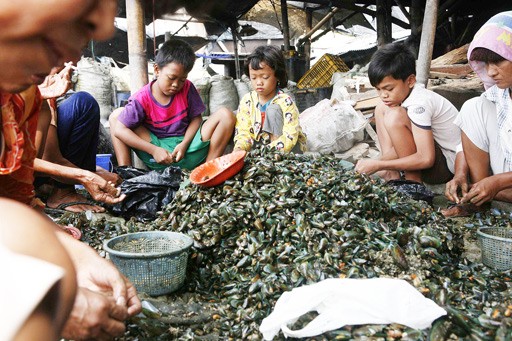Popular Reads
Top Results
Can't find what you're looking for?
View all search resultsPopular Reads
Top Results
Can't find what you're looking for?
View all search resultsIndonesia listed among top 10 in global slavery index
Change text size
Gift Premium Articles
to Anyone
Indonesia is among the top 10 countries with the largest number of people trapped in modern slavery practices, a report says.
"In terms of absolute numbers, Indonesia ranks in ninth place in the Global Slavery Index," Katherine Bryant, a research manager at the Walk Free Foundation and an author of the index, told thejakartapost.com on Thursday.
The foundation, dedicated to ending modern slavery, has looked at 167 countries in its analysis and found around 45.8 million people to be enslaved across the world.
With a population of over 252 million, 0.3 percent of Indonesia’s population, or around 736,000 individuals, are trapped in modern slavery practices. This number has placed the country in 39th place in the global index, specifically in terms of prevalence.
North Korea was rated the worst, where 4.37 percent of the population is trapped in slavery, as well as being the country with the weakest government response.
India remains the country with highest absolute number of people trapped in slavery with 18.35 million people.
In Southeast Asia specifically, Cambodia, Myanmar and Brunei were the top three countries respectively with the highest prevalence. Meanwhile Singapore, one of the region's most prosperous countries, was listed at number 10 in Southeast Asia.
Meanwhile, Indonesia is listed at sixth in terms of prevalence in the Southeast Asian region. "Walk Free Foundation survey data reveals that forced labor in agriculture and the construction industry is one of the most prevalent forms of modern slavery in Indonesia," Bryant said.
The data, which includes a nationally representative survey of the issue, also found cases of forced labor among adults and children in the palm oil industry.
Meanwhile, Indonesian migrant workers are said to be vulnerable to exploitation in the Gulf countries.
"These individuals can pay huge fees to recruitment agencies, and are forced into work for little or no pay until the debt is paid," Bryant said.
Commercial sexual exploitation of women and children also occurs throughout Indonesia, she said, adding that it is worth noting, however, that the country has been given a B rating in terms of government response to the issue.
In its statement, the foundation commended the government, especially pointing to the hosting of the Bali Process, which was co-chaired with Australia recently.
The ministerial meeting resulted in a declaration pledging a comprehensive regional approach to managing mixed migration flows and ensuring humane labor practices within the global supply chains.
Despite this, the foundation calls on the government to do more in response to modern slavery in efforts to eradicate it.
Bryant suggested strengthening regulations in the protection of citizens against slavery practices.
She suggested the government ratify and implement the Domestic Workers Convention (ILO 189) to ensure compliance with international standards, pass the domestic workers protection bill and also ratifying the PO29, a protocol of 2014 to the ILO forced Labor Convention. (bbn)









